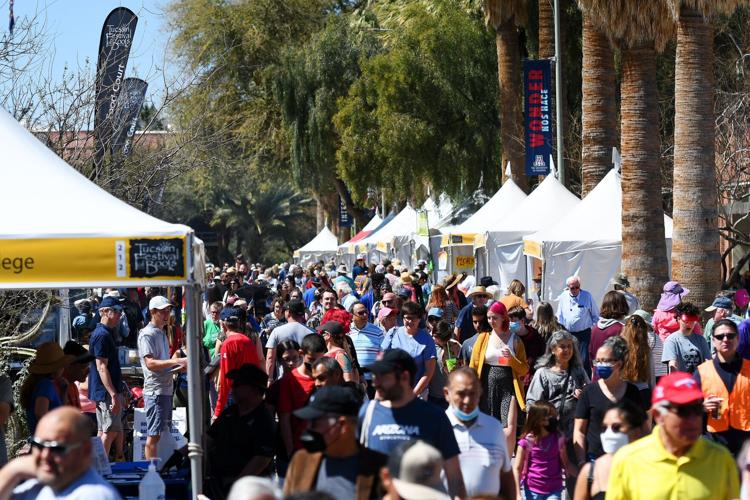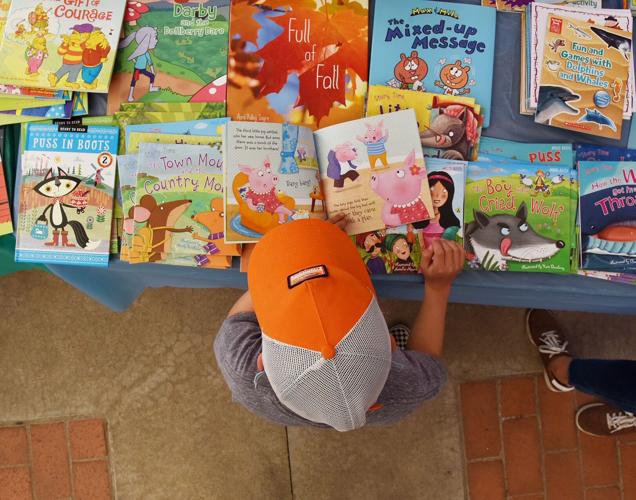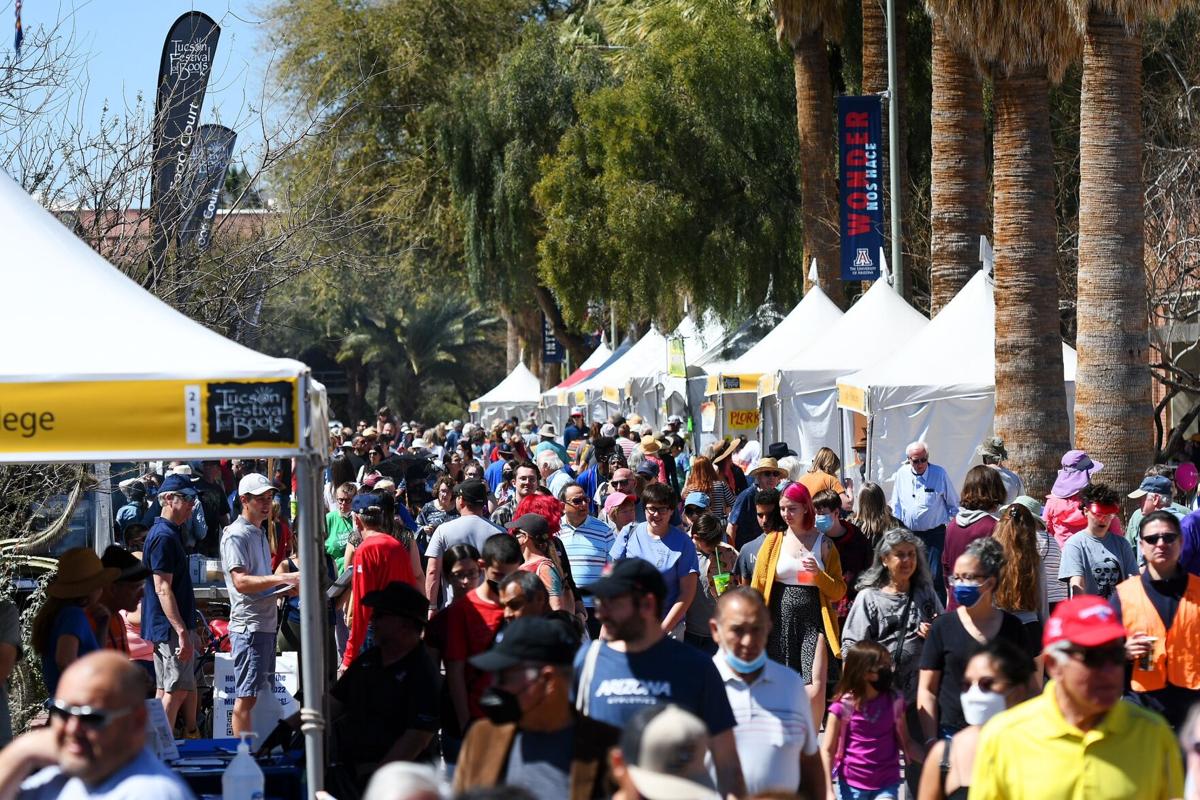The number was big, bold and as chilling as the wind cutting through a 36-degree morning in the desert.
On Jan. 24, just seven weeks before the scheduled start of the Tucson Festival of Books, the Arizona Department of Health Services released Pima County’s new COVID case count from the previous week.
The number: 18,308
It was by far the county’s highest weekly total since the World Health Organization officially declared COVID-19 a pandemic in March 2020.
“I’m not going to lie,” said Melanie Morgan, executive director of the book festival. “The numbers were bad, and getting worse every week. We weren’t sure there would be a book festival or not. But we’d already decided to go live or go home, so we just crossed our fingers and kept on working.”
Those must be some powerful fingers she crossed.
The COVID surge soon ended, the weather warmed, and more than 100,000 people gathered for the 13th annual Tucson book festival, March 12-13.
The phrase “all things considered” isn’t normally the best way to begin a summation, but in this case — all things considered — the event was a triumph.
One of the festival’s key planners, steering committee co-chair David Nix, put it this way: “It wasn’t the biggest festival we’ve ever done, but it was the happiest. From where we’ve been the last two years … and where we were three months ago … I thought we hit it out of the park.”

A child peruses his options at the 2022 Tucson Festival of Books. This year's fest, the first in-person book festival since the start of the pandemic, was smaller but successful.
Tucson’s book festival is one of the five or six largest literary events in the United States. It was the first to cancel in 2020. It was the first to return to an all in-person format in 2022.
If some festival-goers found things a little more accessible, a little less congested this time, it was.
Planners purposely downsized the scope of this this year’s festival, Morgan said. The physical footprint was smaller. The number of spots for exhibitors was reduced. There were five fewer stages for presenting authors.
“The world has changed since we last did an in-person festival three years ago,” Morgan said. “We’ve been through a lot. With all the uncertainty last fall, and not knowing where the pandemic would be this spring … We were optimistic, definitely, but we wanted to be realistic, too. We wanted our goals to be achievable.”
It wasn’t surprising, then, that this year’s festival was 20% to 25% smaller than it had been in a record 2019. Some of the 2022 numbers, with 2019 numbers in parenthesis:
Attendance: 100,000 (130,000)
Presenting authors: 258 (345)
Author presentations: 263 (340)
Number of sponsors: 194 (220)
Number of exhibitors: 184 (220)
Number of volunteers: 1,206 (1,750)
UA Bookstore sales: 8,836 units (10,251)
Those numbers notwithstanding, booksellers and other vendors on the mall reported strong sales — particularly on Saturday.
“My biggest takeaway was the gratitude I felt for the university, our sponsors, our volunteers, everybody,” Morgan said. “This year was different. This was hard, but everybody did more and went farther to make sure it all came together. It was pretty amazing to be part of all that.”
If there were 100,000 people on campus for this year’s book festival, there were probably 100,000 thoughts on how best to measure its success.
Morgan herself isn’t sure. She said attendance is a key metric. The quality of festival authors is another. Happy sponsors, happy vendors and happy authors are on the list. Perhaps the most important measure is this one: As an independent, 501©(3) nonprofit organization, the book festival’s core mission is to support local agencies working to improve literacy in Tucson.
Since the festival began in 2009, it has made donations totaling more than $2 million to groups such as Literacy Connects and Reading Seed. It also partners with Make Way for Books.
Last year, in particular, those donations came up short.
“It may be another four to six weeks before we know how we did, financially, but we’re hopeful we’ll have good news for our agencies,” Morgan said.
Already, the festival was good news for all of us who were there.
Footnotes
There are various ways to measure the size of book events — attendance, participating authors, book sales — but Tucson is generally acknowledged to be one of the five or six largest in the U.S.
Others on the short list are the National Book Festival in Washington. D.C.; the Miami Book Fair; the Decatur Book Festival outside Atlanta; the Texas Book Festival in Austin; and the L.A. Times Book Festival in Los Angeles.
The book festival has also become one of the five or six largest annual events in Tucson. Others include the Gem, Mineral & Fossil Showcase; the Fourth Avenue Street Fair; the Fiesta de los Vaqueros rodeo; Tucson Meet Yourself; and the All Souls Procession.
The festival’s 10th Masters Writing Workshop was held March 14-15 at Lodge on the Desert. The invitation-only Class of ‘22 included 49 writers from six states. Instructors were book festival presenters Julissa Arce, Maria Amparo Escandon, Laird Hunt, David Heska, Wanbli Weiden and Felicia Zamora.
Morgan said next year’s Tucson Festival of Books will be held March 4-5 or March 11-12. The official dates will probably not be announced until September.
Photos and video highlights from the 2022 Tucson Festival of Books
The Tucson Festival of Books made it's return from a one year COVID-19 hiatus, March 12, 2022. Hundreds of vendors, authors, entertainers and …
Watch now: Bob Odenkirk talks about new memoir, career at Tucson Festival of Books
UpdatedThe "Better Call Saul" star spoke to attendees of the Tucson Festival of Books on Sunday about his acting career and new book "Comedy Comedy Comedy Drama: A Memoir." Odenkirk, who also starred in AMC's "Breaking Bad," was joined on stage by television director Noah Hawley.
Watch now: Bob Odenkirk answers audience questions at Tucson Festival of Books
UpdatedThe actor and author answered questions following his panel at the Tucson Festival of Books, including some written by Odenkirk himself.
Watch now: Novelist Viet Thanh Nguyen gives keynote address at Tucson Festival of Books
UpdatedNovelist Viet Thanh Nguyen described his upbringing as a child of refugees in California and his introduction to literature during his keynote address at the Tucson Festival of Books Author's Table Dinner on March 11, 2022. Video courtesy of Tucson Festival of Books.






